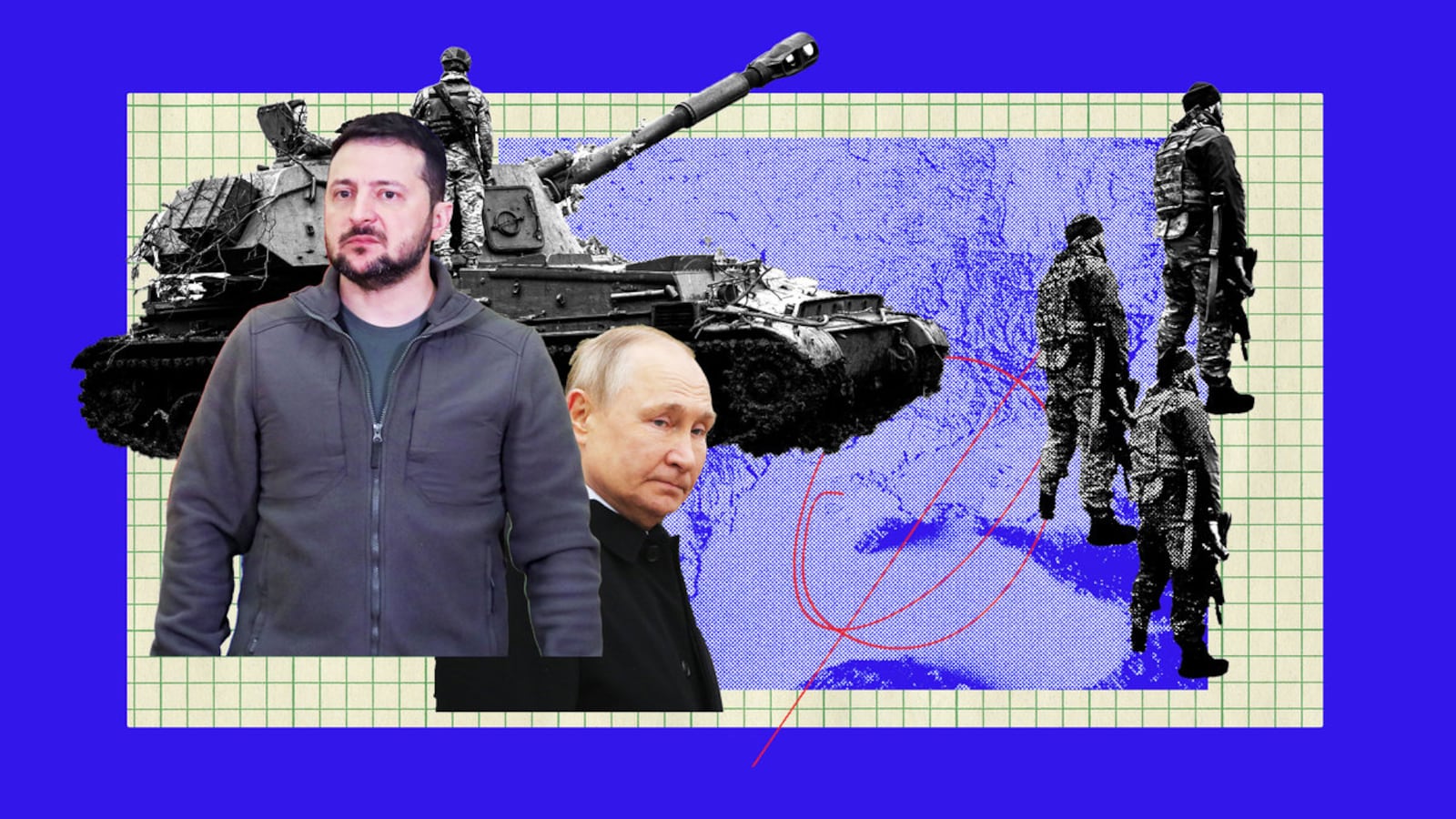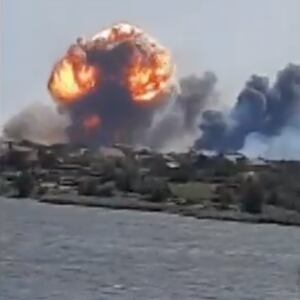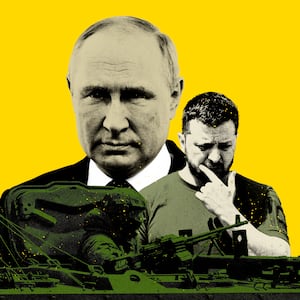Ukrainian forces are working to force Russia to retreat from Kherson, a key region Russia seized in the early days of the war this year. But behind the scenes, Ukrainian President Volodymyr Zelensky’s administration is plotting next steps for a takeover of Crimea, which Russia has been occupying since 2014 when Vladimir Putin illegally annexed the peninsula.
Tamila Tasheva, the official responsible for the plan to take back Crimea and kick Russia out, told The Daily Beast she is looking to the battlefield and an underground network of informants in Crimea to help.
Tasheva has long believed the “main mechanism” for kicking Russia out will depend on political factors and diplomacy with allies. But as the invasion has raged into its ninth month and Ukraine has begun to gain momentum in counteroffensives, the military component of the Crimea takeover is upon the Ukrainian government.
The “main mechanism of deoccupation” is the “political and diplomatic way,” Tasheva told The Daily Beast in an exclusive interview this week. “But of course we also in this strategy of deoccupation, we also [talk] about another mechanism of deoccupation including, of course, military components of deoccupation.”
Ukraine’s intelligence services have told her they believe Ukraine will be able to seize Crimea by the spring or summer of 2023, Tasheva said. But she thinks it might happen sooner.
“General Budanov also mentioned that we could deoccupy the territory of Crimea at the end of spring 2023 and maybe in summer,” Tasheva said, referring to Kyrylo Budanov, Ukraine’s top military intelligence official. “It’s really my belief that we return Crimea back to Ukraine in a shorter period of time.”
The Zelensky administration’s optimism about liberating Crimea underlines the dramatic shift in momentum in the war over recent months. Global leaders who fretted that Kyiv would fall to Russia in a matter of days after Russia’s invasion are now watching Ukrainians make stunning gains on the battlefield. The strategy has now shifted from talk of clawing back territory Russia has taken this year to taking back territory Russia took in 2014, including Crimea.
“We understand that the situation dramatically changed after the full scale invasion,” Tasheva said, noting that victory for Ukraine lies in pushing Russia out with its 2022 and 2014 gains in mind. “We have had a war in Ukraine for more than eight years, and it has not started on Feb. 24 this year, but eight years ago with the occupation of Crimea.”
The timeline for Ukraine to try to retake Crimea is unclear, Tasheva pointed out. But with the Ukrainian military forcing Russia to retreat from multiple pockets of Ukraine, the prospect is closer than ever before.
“I don’t know at this moment and maybe… nobody… [has] really concrete data when we deoccupy Crimea,” Tasheva said. “But it’s a shorter period than we expected one year ago.”

Permanent Representative of the President of Ukraine in the Autonomous Republic of Crimea Tamila Tasheva
Inna Borodaieva / Ukrinform/Future Publishing via Getty ImagesThe retaking of Crimea by Ukraine would be a major blow to Moscow. For Putin, losing Crimea would be personal, and could threaten his political legitimacy in Russia, especially considering his popularity ratings surged when he seized Crimea in 2014, according to Angela Stent, a former national intelligence officer for Russia and Eurasia at the National Intelligence Council.
“This is one of his claims to legitimacy,” Stent told The Daily Beast. “One of the major claims is that he restored Crimea to its rightful place. If Crimea were now to be taken by the Ukrainians, then that would be a huge blow to his own legitimacy.”
“The concern would be what the next kind of escalation might be from Russia,” Stent said.
Already, following numerous attacks on Russian military entities in Crimea, Russia has intensified assaults on Ukrainian infrastructure, knocking out Kyiv’s water and power supplies. These attacks show Putin is likely raging about incursions into Crimea, according to Stent.
“Putin senses—and the people around him—the reality that their army really is doing very badly… therefore, you have this intensification of the strikes on infrastructure,” Stent said.
If Ukraine tries to kick Russia out of Crimea, it could run the risk of giving Putin a way to galvanize support domestically for the war, warned John Herbst, the former U.S. Ambassador to Ukraine.

Ukrainian soldiers carry a wounded comrade across a heavily damaged bridge over the Oskil River on Sept. 30, 2022 in Kupiansk, Ukraine.
Scott Peterson/Getty Images“A little bit of caution is in order,” Herbst told The Daily Beast. “A serious Ukrainian offensive in Crimea might enable Putin to rally support at home for his misbegotten war.”
Tasheva’s confidence about planning a Crimea takeover comes as signs emerge that Russia could be preparing to retreat from Kherson, which would be a necessary precursor to going after Crimea, she said.
Russian forces seized Kherson in the early days of the war. It sits just north of Crimea and represents a key component of Putin’s dreams to create a “land bridge” from Russia to Crimea, which has been crucial to supplying troops and pushing northwards into Ukraine.
And although Russian forces were able to take Kherson—in part by using Crimea as a launchpad—it’s now Moscow’s only major stronghold on the western side of the Dnieper River.
Tasheva acknowledged that booting Russia from Kherson should come before going after Crimea.
“We understand it’s really connected—deoccupation of Crimea—connected to the situation in the battlefield, in the southern part of Ukraine, especially deoccupation of Kherson,” Tasheva said.
Some of Russia’s foothold is starting to crumble, according to U.S. officials and reports from the ground. A Russian-installed administrator for the region said Thursday that Russia may abandon the region soon.
“Most likely, our troops will leave for the left-bank part of the Kherson region,” Kirill Stremousov, the Russian-installed deputy chief for the region, told Solovyov-Live.
Videos have emerged from Ukraine showing Russian flags had been taken down from the regional administration building in Kherson, according to Russian war correspondent Sasha Kots.
For Ben Hodges, the former commander of the U.S. Army in Europe, Russia’s fate is all but sealed, given Russia’s poor logistics and Ukraine’s methodical approach.
“As long as we continue to provide them with what they need, to me this is irreversible. The Russians cannot stop it,” Hodges said. “The only thing that they’re able to do right now is murder innocent people.”
But although there’s promise in Kherson, roadblocks remain. Rains in recent days have made the approach muddy and slow for Ukrainians, The Washington Post reported. Ukraine’s military said last week that Russia had moved up to 1,000 troops into the region.
Despite reports of a potential Russian retreat, Ukrainian progress on the battlefield has been slight, The White House said Friday.
“The lines… have been pretty well static over the last few days, not much movement,” White House National Security Council Coordinator John Kirby said on a call in response to a question from The Daily Beast. “We continue to see that the Ukrainians are making some incremental progress in the south.”
The White House declined to comment on Ukraine’s prospects of taking back Crimea.
And although the timing is up in the air on when Kyiv will make the move, one thing is clear: Kyiv’s plan includes cutting the peninsula off completely from Russia once Zelensky’s forces kick Russia out, according to Ukrainian military intelligence. Budanov indicated in an interview that a key bridge that connects Crimea to Russia, the Kerch bridge, will be taken out once Crimea is deoccupied.

People look at thick black smoke rising from a fire on the Kerch bridge that links Crimea to Russia, after a truck exploded, near Kerch, on Oct. 8, 2022.
Roman Dmitryev/AFP via Getty Images“The Crimean bridge is the symbol that will be destroyed. When Crimea returns, this bridge will cease to exist,” Budanov said.
Concerns remain that Russia might interpret an attempt to retake Crimea as an invasion of Russian territory, particularly as Moscow has been hinting it might use nuclear weapons if its territory is threatened.
Tasheva doesn’t buy it.
Russia is “nuclear blackmailing,” Tasheva said, adding that she thinks kicking Russia out of territory it illegally annexed is not cause for escalation.
European leaders in particular have expressed concerns to Tasheva about Russia escalating over Crimea attacks. But for those who are worried, Tasheva stressed it’s not just about taking back territory from Russia. It’s about saving civilians, Crimean Tatars, and Ukrainians from Russia’s brutality.
“To deoccupy Crimea, it’s not an escalation. It’s our way for a liberation,” Tasheva told The Daily Beast. “When I speak with some of my friends or colleagues in European Union, for example, and when they asked me about escalation and about nuclear blackmailing and what we must do with it, and maybe Ukraine must do some compromises… we always say no. No compromise.”

A man rides a scooter with a child in front of an image of a stamp showing explosions on the Kerch Bridge, a key supply route Russia built after it illegally annexed Crimea, on Oct. 12, 2022 in Kyiv, Ukraine.
Metin Aktas/Anadolu Agency via Getty Images“Because it’s not only about territory, because Russians during the years of occupation persecute people,” she added.
Tasheva and her team have their work cut out for them. In preparation for liberating Crimea and then reintegration, they have begun working with an “underground” network of human rights activists, non-governmental organizations, and dedicated civilians in Crimea who can help when the time comes, Tasheva said.
“We really work with people underground—with activists, with lawyers… with ordinary Crimeans—who now live in Crimea,” Tasheva said.
The work of sharing information outside of Crimea has been difficult since 2014. But it has grown incredibly sensitive and dangerous in recent months, according to those working with locals to share information with advocacy organizations about human rights abuses, political prisoners, Russian detention centers, and torture.
“The situation has obviously become extremely difficult since February in terms of access to the peninsula, as far as reaching out to and speaking with activists and others who are in Crimea,” Dave Elseroad, the Head of Advocacy for Human Rights House Foundation, which works to advance freedom of expression, assembly, and association in Crimea and across Eastern Europe, the Western Balkans, and the Caucasus, told The Daily Beast. “It’s certainly risky for them.”
It’s a gamble for those who choose to share information about the Russian occupation, so most of it must be done secretly so it’s obscured from Moscow, since Russia has systematically quashed freedom of expression and assembly in Crimea, and particularly discriminates against the Crimean Tatar community, according to Elseroad.
Four organizations that the Human Rights House Foundation works with “have informal networks” and “are still operating across the peninsula,” Elseroad said.
The list of tasks and horrors that Ukraine has to confront in Crimea is seemingly endless. There have been reports of enforced disappearances, torture, extrajudicial punishment, and forced conscription with Russia. There are also reports of Russian authorities placing Crimean dissidents in psychiatric institutions.
Crimean Tatars, a group Ukraine recognized last year as an indigenous people, have been one of the most vocal groups opposed to Russia’s occupation. Russia’s crackdown against them has been relentless, activists say.
And as Russia’s occupation continues, the list of human rights abuses is only growing.
“We’re seeing a significant increase in number of individuals who are being disappeared,” Elseroad told The Daily Beast. “The situation got progressively worse over the years… since 2022, it’s gone from bad to worse.”
As the fog of war grips Ukrainian forces, for Crimeans, kicking Russia out is existential.
“We fight for our people… it’s not only territory,” Tasheva said. “It’s also about values, values of freedom, values of human rights.”








